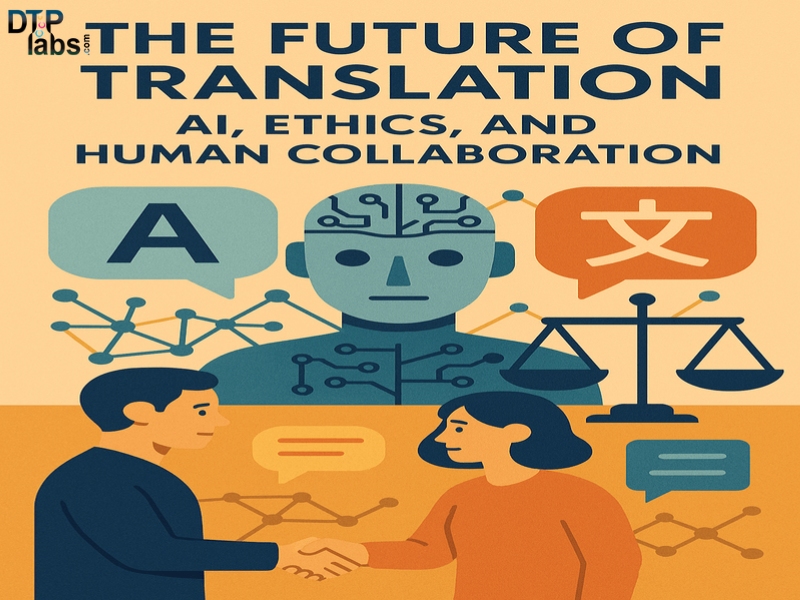Introduction
Artificial intelligence (AI), thanks to the use of automatic learning and natural language treatment, has profoundly transformed translation and interpretation. Tools like Google Translate and Deepl provide rapid translations, improvement accessibility and support intercultural communication. However, the problems of precision, contextual understanding and cultural sensitivity always pose significant challenges, sometimes resulting in erroneous interpretations. Improving the quality of translation and reduction of biases requires a cooperative strategy that combines AI and human skills. This chapter critically examines the dynamics between human translators and AI, focusing on collaborative approaches, ethical implications and strategies to promote effective future partnerships.
How AI changes the translation industry
AI will ultimately increase the productivity of the translation services sector. Regardless of the sector, companies will no longer need to take into account the time required to obtain themselves in experienced translators during time planning. The projects can start faster and respect the deadlines and milestones are simpler.
Big Data exploration advantages
AI allows translation software to quickly access and process large sets of relevant information data. Google Translate is particularly effective in this area. Only about twice as many words are translated each year by human translators.
We are still far from carrying out impeccable machine translations, because the AI is not yet perfect. However, translation technology is progressing quickly. From regular users to small and medium -sized enterprises that may not be able to pay for traditional translation services, it undoubtedly puts useful translations available to everyone.
Why human translators are always essential
Professional human translators with in -depth language translation training are used in human translation. They will include the subtleties of the original material because they are often native speakers. For thousands of years, professional translation services employing qualified linguists have been used. The expertise and commitment of human translators can guarantee excellent results.
Here are some key reasons why human translators are always crucial:
Precision:- Since the automatic translation software is as good as the data it can store, humans are even more sophisticated than machines. Because human translators are able to interpret and communicate the meaning while considering the target audience, their translations are more precise.
Confidentiality and security: – The ability to preserve security and confidentiality is another advantage of using human translation. Human professionals are linked by ethical rules, which can be invoked to protect sensitive information.
The human element: It is crucial to recognize the important role that human participation plays in translation. Understanding the author's objectives, feelings and history of the author is just as important as simply translating words from one language to another when translation of a work. Machines cannot correspond to the complexity and compassion that human translators bring to their work.
Ethical concerns in the translation of AI
Bias:- With the creation of automatic translation technologies (MT), artificial intelligence (AI) has completely transformed the translation sector. Although these technologies have increased precision and translation speed, biases always affect them. The systematic and unfair modification of data that produces unjust or inaccurate results is known as biases in AI.
Data bias: This happens when the training data used to create AI models are inaccurate, lacking in representativeness or inadequate.
Confidentiality
Large volumes of data, including sensitive and private information, must frequently be gathered and processed in order to use translation systems powered by AI. Data security and confidentiality are questioned.
The Future: Human-Aai Collaboration in translation
The future of translation will be influenced by cooperation between AI and human translators. Human translators continue to play a crucial role in creating excellent contextually precise translations, even if IA technology transforms the translation sector. In XL8, we believe that collaboration between humans and AI could transform location and allow infinite communication between companies and people. Linguistic obstacles can be crossed with more success than ever thanks to the combination of the efficiency of AI and human skills, which makes international communication more accessible and inclusive.
The future of human-Ai collaboration has immense potential. As AI advances, it will improve the human capacities of creativity, problem solving and emotional intelligence. Innovations such as laptop and augmented reality (AR) will deepen the integration of AI into daily tasks, increasing decision -making and productivity in various industries.
Conclusion
The AI transforms the industry by making translation more quickly and more accessible, but it cannot replace cultural insight, emotional intelligence and the creative judgment of human translators. Ethical considerations must guide the way we implement and use AI to guarantee equity, confidentiality and responsibility.
As we progress, the most successful translation strategies will combine the speed and scale of AI with the nuance and depth of human expertise. This collaboration will not only improve the quality of translation, but will also open up new possibilities for intercultural communication in an increasingly connected world.
DTP Labs is an office publishing company based in New Delhi, India. We offer book publication services, PDF conversions to words, post-traduction DTP and online location services to translation agencies around the world. To benefit from our services, consult our website www.dtplabs.com or contact us at info@dtplabs.com.


